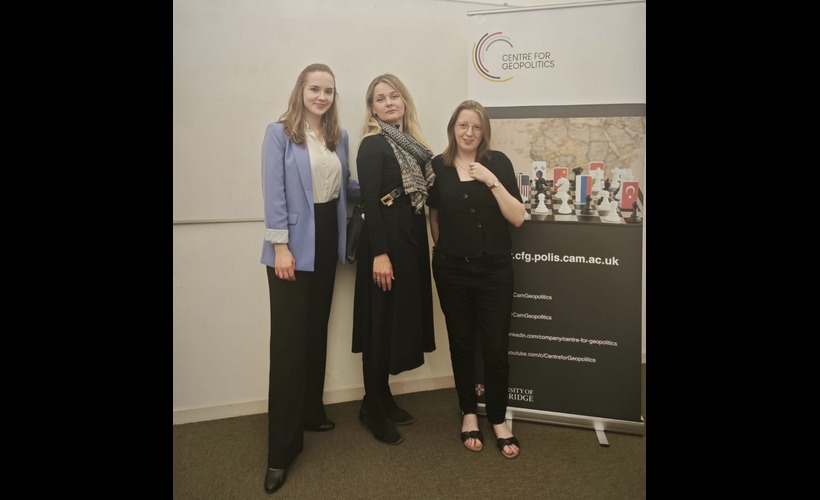By Rt Hon Charles Clarke, Joint Leader of the Baltic Geopolitics Programme
The first major in-person Symposium of the Baltic Geopolitics Programme – ‘The Baltic contribution to the dissolution of the Soviet Union in 1991’ – took place in the Theatre at Peterhouse on Wednesday 23 March 23 and also marked the first anniversary of the launch of the Programme.
The Symposium was chaired by Charles Clarke. Bridget Kendall, Master of Peterhouse, opened the meeting by welcoming to the historic venue more than 100 participants from the academic, diplomatic, media and military worlds with wide representation from the Baltic Sea region itself.
The Keynote for the Symposium was given by Professor Kristina Spohr who outlined the place of the Baltic States in the relationship between Russia and Europe’s Order from 1917 to 1991 to 2022. She set out the whole context within which the events of 1991 played out and their significance. Her presentation can be viewed here.
In the first panel session, on The international preconditions for the freedom of the Baltic States and the collapse of the Soviet Union Professor Jonathan Haslam set out the general international context and the ways in which that influenced what was happening in the Soviet Union. Dr Mart Kuldkepp then explained the attitudes of other countries in the Baltic sea region, particularly Sweden.
Professor Stefan Hedlund began the second panel session, on The contribution of the independence campaigns in the Baltic states, by setting out the sequence of events as they unfolded, beginning with campaigns around environmental challenges, and highlighting the day-by-day decisions which were taken. Professor Kaarel Piirimae then demonstrated the impact of this process both for the Baltic States themselves and for the Soviet Union.
After lunch the third panel session discussed the Responses in Moscow to events in the Baltic. Professor Archie Brown emphasised that what made the break-up of the Soviet Union certain was Yeltsin’s assertion of Russian independence from the Soviet Union. Professor Vladislav Zubok, based on his research in the archives which have recently become available, then described how the Baltic supporters of independence had been able to take advantage of the processes of glasnost and perestroika to promote their own agenda, to which Gorbachev and his colleagues had no effective counter-strategy.
Britain’s approach was discussed in the fourth panel session, How Britain dealt with events in the Baltic at this time. First the Chief Foreign Office historian Patrick Salmon, discussed the ways in which British foreign policy circles responded to the ways in which events were unfolding, as well as the British focus at the time on events in the Gulf War. Bridget Kendall, who was the BBC correspondent in Moscow during this period, described how the Baltic republics were working to a different timetable and terms of reference from what she was observing in Moscow. And then Sir David Lidington, from the floor, gave an interesting account from his vantage point at the time, as the Special Adviser to Douglas Hurd the Foreign Secretary.
The final Panel session, Contemporary implications of interpretations of the history of 1991, addressed the importance of historical narratives, often false, in informing contemporary events. Professor Inga Zakšauskienė analysed the ways in which Kremlin disinformation was used to ‘justify’ their actions in Ukraine. Professor Andrew Wilson then explained the background to events in Ukraine and the contrasts and comparisons between Ukraine and what happened to the Baltic States in 1991.
Donatas Kupciunas, the Research Associate at the Baltic Geopolitics Programme gave the concluding address summing up the importance of these events themselves, their impact on people’s ordinary lives – not just as an aspect of great power politics – and the necessity of appreciating the impact of history upon the ways that events take place.
The Symposium was followed by a Reception and Dinner at the Graduate Cambridge hotel.
The Reception was addressed by Sturla Sigurjonsson, Iceland’s Ambassador to the UK. He explained Iceland’s role in being the first country in the world to recognise formally in 1991 the Baltic States’ regained independence as sovereign nations, despite threats from Moscow.
The warm and positive environment amongst the participants in the Symposium contributed to a general feeling that the whole event had been very successful
The day afterwards the Baltic Geopolitics Network took the decision to establish an annual event in Cambridge in March.







